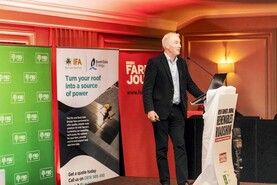Ireland’s efforts to increase its share of renewables in the heat sector is set for a major shake-up.
Having failed to meet our target of 12% heat coming from renewable sources by 2020, dramatic action is needed.
This looks set to take the form of a renewable fuel obligation scheme for the heat sector.
Under the climate action plan, an updated annex of actions was published in March of this year and Action 57b outlines the consideration of introducing a renewable energy obligation in the heat sector.
Such an obligation would require suppliers of energy in the heat sector to ensure a certain percentage of the energy they supply is renewable. This percentage would start off low, but would increase incrementally each year.
This would dramatically change the landscape of the heat sector, as every fuel supplier, from gas shippers to local coal suppliers, would be subject to the obligation.
Consultation
The Irish Farmers Journal understands that a public consultation on whether an obligation should be introduced along with the planned timeframe and scope is being prepared. This will likely be published in the coming month.
In a statement, the Department says that this consultation will allow stakeholders and the general public to provide their input, including the level of obligation that would be put in place, the type of renewable energies that could meet the obligation and how the obligation could be administered and funded.
Policy driver
The statement continues: “It should be noted that no decisions have yet been made in relation to whether an obligation should be put in place and, if one were to be, how it would be structured. This will only be determined once the public consultation has been completed.”
However, tough new renewable heat measures under EU Renewable Energy Directive II (REDII) have just come into effect.
Article 23 under REDII obliges member states to have at least 1.3% renewable heat in their heat mix by 2026 at the latest.
This increases incrementally by 1% every year thereafter to meet the renewable heat targets set by the Irish Government.
Market development
If introduced, the obligation scheme would therefore stimulate the demand for renewable alternatives in the heat sector.
In the case of natural gas, the most immediate economical renewable alternative is biomethane, which can be produced indigenously from farm-based anaerobic digestion plants.
This renewable gas can be injected directly into the national gas grid or transported via road to off-grid customers.
However, at a cost of around 8.4c/KWh to produce, and with wholesale price of natural gas around 3c/KWh, the challenge turns to bridging the biomethane production cost gap of 5.4c/KWh.
This will likely be achieved by spreading the cost of biomethane among all fuel customers of that supplier.
It is understood that the onus will be on the supplier to secure the renewable fuel. This could result in competition from the suppliers to secure renewable alternatives such as biomethane.
Ireland’s efforts to increase its share of renewables in the heat sector is set for a major shake-up.
Having failed to meet our target of 12% heat coming from renewable sources by 2020, dramatic action is needed.
This looks set to take the form of a renewable fuel obligation scheme for the heat sector.
Under the climate action plan, an updated annex of actions was published in March of this year and Action 57b outlines the consideration of introducing a renewable energy obligation in the heat sector.
Such an obligation would require suppliers of energy in the heat sector to ensure a certain percentage of the energy they supply is renewable. This percentage would start off low, but would increase incrementally each year.
This would dramatically change the landscape of the heat sector, as every fuel supplier, from gas shippers to local coal suppliers, would be subject to the obligation.
Consultation
The Irish Farmers Journal understands that a public consultation on whether an obligation should be introduced along with the planned timeframe and scope is being prepared. This will likely be published in the coming month.
In a statement, the Department says that this consultation will allow stakeholders and the general public to provide their input, including the level of obligation that would be put in place, the type of renewable energies that could meet the obligation and how the obligation could be administered and funded.
Policy driver
The statement continues: “It should be noted that no decisions have yet been made in relation to whether an obligation should be put in place and, if one were to be, how it would be structured. This will only be determined once the public consultation has been completed.”
However, tough new renewable heat measures under EU Renewable Energy Directive II (REDII) have just come into effect.
Article 23 under REDII obliges member states to have at least 1.3% renewable heat in their heat mix by 2026 at the latest.
This increases incrementally by 1% every year thereafter to meet the renewable heat targets set by the Irish Government.
Market development
If introduced, the obligation scheme would therefore stimulate the demand for renewable alternatives in the heat sector.
In the case of natural gas, the most immediate economical renewable alternative is biomethane, which can be produced indigenously from farm-based anaerobic digestion plants.
This renewable gas can be injected directly into the national gas grid or transported via road to off-grid customers.
However, at a cost of around 8.4c/KWh to produce, and with wholesale price of natural gas around 3c/KWh, the challenge turns to bridging the biomethane production cost gap of 5.4c/KWh.
This will likely be achieved by spreading the cost of biomethane among all fuel customers of that supplier.
It is understood that the onus will be on the supplier to secure the renewable fuel. This could result in competition from the suppliers to secure renewable alternatives such as biomethane.






 This is a subscriber-only article
This is a subscriber-only article











SHARING OPTIONS: